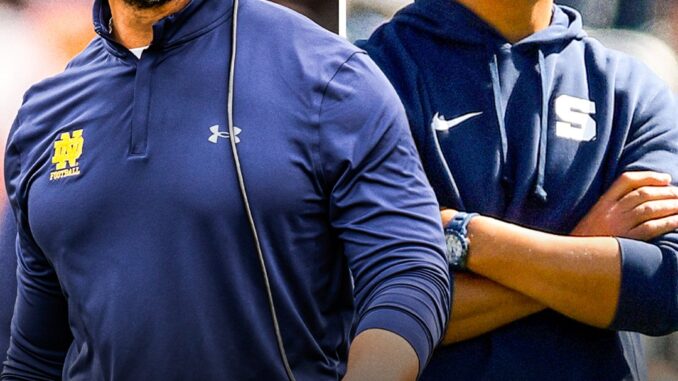
A Revolution in Coaching: The Changes that Could Cost Some Coaches Their Jobs
The world of sports, especially professional sports, is no stranger to change. Whether it’s evolving technologies, shifting player dynamics, or new business models, each season brings about adjustments that shape the landscape. One of the most significant and often overlooked shifts is the evolution of coaching. From how coaches are evaluated to the strategies they employ, changes in coaching paradigms have profound impacts on the careers of those in charge. The rise of new philosophies, advanced analytics, and increasingly high expectations could lead to job losses for some coaches in the coming years. These changes mark a new era where job security isn’t just about on-field performance, but how well a coach adapts to an ever-changing, multifaceted environment.
### The Evolution of Coaching: More Than Just X’s and O’s
Coaching used to be a straightforward role: teach players the fundamentals, inspire them to perform, and adjust tactics during games to outsmart the opposition. While these core responsibilities are still relevant today, the demands on a coach’s expertise have expanded dramatically. Coaches are no longer just strategists; they must also be data analysts, psychologists, and business managers. With the increasing commercialization of sports, owners and executives have become more results-driven and less patient with underperformance. As the sporting world becomes more competitive and globalized, coaches must constantly evolve or risk losing their job.
One of the most notable shifts has been the increased importance of data analytics. Analytics departments are no longer just a supporting feature of sports organizations but are integral to decision-making at all levels, from player acquisitions to in-game strategy. While some coaches have embraced this change, others have resisted, preferring to rely on intuition, experience, and traditional methods. As a result, coaches who fail to integrate data-driven decision-making may find themselves obsolete in a sport where every advantage counts.
### The Analytics Revolution
The advent of advanced statistics has revolutionized the way sports are analyzed. From basketball’s use of player efficiency ratings to soccer’s xG (expected goals) metric, data analytics has transformed how teams evaluate player performance and develop strategies. Coaches are now expected to interpret and act on data quickly, making adjustments during games that might not be apparent to the naked eye. This ability to use analytics to inform decisions is becoming a critical skill for coaches, and those who don’t adapt face the risk of being left behind.
For instance, in Major League Baseball, the “Moneyball” revolution brought a focus on sabermetrics to the forefront, leading to significant changes in roster construction and game strategy. Teams that embraced these changes, like the Oakland Athletics, found success despite financial constraints. Similarly, coaches who can harness data to gain a tactical advantage have become highly sought after. Conversely, those who dismiss analytics as a passing trend risk falling out of favor as more organizations prioritize data-informed decision-making.
### The Rise of the Sports Scientist
In addition to analytics, the increasing role of sports science in coaching is another key development. Fitness, injury prevention, recovery, and overall athlete well-being are now considered critical to a team’s success. Many organizations have established dedicated sports science departments that work alongside coaches to monitor players’ physical conditions and help them perform at their peak.
Coaches must now understand the nuances of sports science, particularly when it comes to managing player load, recovery cycles, and injury prevention. The ability to optimize player health has a direct correlation with on-field performance, and a coach’s ability (or inability) to work seamlessly with these departments can determine their long-term job security. If a coach fails to prioritize player health and optimize performance in this way, they may soon find their job on the line as the pressure mounts from owners and management to maintain player longevity and performance.
### Changing Leadership Models
Another critical shift in coaching is the way leadership is perceived and practiced. The “old-school” approach of authoritarian leadership, where coaches are expected to instill discipline through command and control, is being replaced by more modern leadership styles. Today’s players, particularly younger generations, respond better to leaders who show empathy, understanding, and the ability to build relationships based on trust.
Moreover, the changing dynamics of professional sports organizations mean that coaches are increasingly expected to be excellent communicators, motivators, and managers of personalities. In team sports like basketball, football, and soccer, where players come from diverse backgrounds and possess distinct egos, the ability to foster a unified culture and manage personalities has become just as important as the tactical and technical aspects of coaching.
Coaches who struggle to adapt their leadership style to this evolving dynamic may find themselves at odds with their players, making it difficult to maintain a winning culture. As sports organizations place greater emphasis on emotional intelligence and interpersonal skills, coaches who don’t invest in these areas risk losing their players’ respect and ultimately their job.
### The Pressure of Instant Results
The modern sports environment also places unprecedented pressure on coaches to produce results quickly. Gone are the days when a coach could enjoy years of job security while building a team or implementing a new system. In today’s world of instant gratification, fans, media, and owners demand immediate success. High expectations often translate into short leashes for coaches, with even minor dips in performance resulting in their dismissal.
The rise of the “hire and fire” mentality means that coaches must produce results from day one, or risk being replaced. The competitive nature of sports, especially at the professional level, has created a scenario where even a single season of underperformance can result in a coach being fired. Coaches are increasingly judged not just on the number of wins and losses but on their ability to navigate the complexity of managing teams, personalities, and evolving technologies. The pressure to meet these expectations can be overwhelming, and those who don’t succeed may find themselves out of a job.
### Conclusion: The Unforgiving Future
As the sports industry continues to evolve, so too will the expectations placed on coaches. The increasing reliance on data analytics, the growing role of sports science, and the changing expectations of leadership are just some of the factors that will continue to reshape the coaching profession. For some, these changes represent an opportunity to grow and thrive, while for others, they pose an existential threat to their careers.
The future of coaching will be defined by those who are willing to adapt, embrace new technologies, and evolve their leadership styles to meet the demands of a rapidly changing landscape. Coaches who resist change or fail to grow with the times may find themselves out of a job as their methods and philosophies become outdated. It’s a revolution in coaching that could cost some of the most established names their positions, leaving only those who can keep up with the ever-increasing pace of change in the world of sports.



Be the first to comment